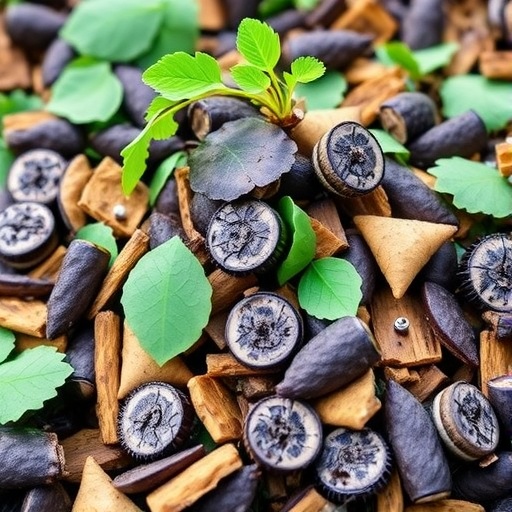In recent years, the growing demand for sustainable practices in agriculture has sparked significant interest in waste management techniques, particularly the importance of composting. A novel study led by Ali, Kachroo, Gupta, and colleagues explores the impact of various biodegradable agents and techniques on the decomposition of farm waste to produce high-quality compost. This research not only highlights the potential of biodegradable additives to enhance the composting process but also emphasizes the critical role they play in promoting sustainability in agricultural practices.
Composting is an organic matter recycling process that transforms farm waste into valuable soil amendments. As populations expand and climate challenges persist, traditional waste disposal methods are increasingly viewed as unsustainable. This study focuses on the use of biodegradable agents, such as plant residues, manures, and other organic materials, to accelerate the decomposition of farm waste. These agents serve as valuable carbon and nitrogen sources, leading to microbial activity that is essential for efficient composting.
One of the key findings from this research is the optimization of composting conditions. The study demonstrates that temperature, moisture content, aeration, and particle size are pivotal parameters influencing the efficiency of biodegradation. Optimal conditions not only enhance the speed of decomposition but also improve the nutrient quality of the final compost product. By carefully controlling these variables, farmers can significantly increase their compost yield and its effectiveness as a fertilizer.
The research also delves into the functionality of various biodegradable agents compared to traditional composting methods. The introduction of agents like biochar and specific microbial inoculants illustrates a shift towards more innovative composting practices. Biochar, for instance, not only acts as a carbon source but also enhances soil health and fertility in a multitude of ways. Its porous structure promotes water retention and provides habitat for beneficial microorganisms, ultimately enriching the soil ecosystem.
In addition to exploring biodegradable agents, the authors examined different composting techniques, such as vermicomposting and Bokashi fermentation. Vermicomposting utilizes earthworms to process organic waste, resulting in nutrient-rich castings that can vastly improve soil quality. Meanwhile, Bokashi fermentation provides a unique anaerobic method of composting that can be practiced indoors, allowing for year-round composting capabilities irrespective of climate conditions. Both techniques are gaining traction as effective alternatives to conventional composting and provide solutions to urban waste management challenges.
The implications of this study extend beyond the immediate agricultural benefits. Proper composting practices not only divert waste from landfills but also mitigate greenhouse gas emissions often associated with waste decomposition in anaerobic conditions. By understanding the effects of biodegradable agents and proper techniques, this research underscores the potential to contribute to a circular economy in organic waste management, fostering a more sustainable approach to farming.
Furthermore, the long-term benefits of high-quality compost cannot be overstated. Ultimately, the research encourages farmers to transition from chemical fertilizers towards organic alternatives, enhancing soil quality and biodiversity. Healthy soils lead to more resilient crops, which can significantly reduce the need for chemical interventions. This is particularly important in the context of sustainable agriculture and the global push to reduce the environmental footprint of farming practices.
Moreover, the study emphasizes the importance of local adaptation. Each farm presents unique characteristics in terms of climate, soil type, and available organic materials, thus requiring tailored composting methods to achieve optimal results. The authors encourage farmers to experiment with a combination of biodegradable agents and techniques suitable for their specific conditions, reinforcing the idea that local knowledge and practices play a crucial role in sustainable agriculture.
In conclusion, the research by Ali et al. opens the door to new possibilities in farm waste management and composting. As the agricultural sector grapples with its impact on the environment, the findings underline the urgent need for sustainable practices that not only improve soil health but also support a stable food system. The innovative use of biodegradable agents and techniques shifts the paradigm towards a more circular and resilient agricultural framework, one that is capable of meeting the demands of a growing population while protecting our planet.
This groundbreaking study holds significant promise for farmers, environmentalists, and policymakers alike, as it drives home the critical message that effective composting is not merely a waste management solution, but a pivotal component in the quest for sustainability in food production. By adopting these findings, we can look forward to a future where agriculture thrives in harmony with the ecosystem and contributes positively to the fight against climate change.
Subject of Research: The impact of biodegradable agents and techniques on farm waste decomposition for high-quality compost.
Article Title: Impact of Various Biodegradable Agents and Techniques on Farm Waste Decomposition for High-Quality Compost.
Article References:
Ali, A., Kachroo, D., Gupta, A.K. et al. Impact of Various Biodegradable Agents and Techniques on Farm Waste Decomposition for High-Quality Compost.
Waste Biomass Valor (2025). https://doi.org/10.1007/s12649-025-03356-3
Image Credits: AI Generated
DOI: 10.1007/s12649-025-03356-3
Keywords: composting, biodegradable agents, farm waste, sustainability, organic fertilizers, soil health, carbon source, microbial inoculants, vermicomposting, anaerobic fermentation, waste management, circular economy, environmental sustainability.
Tags: benefits of biodegradable additivesbiodegradable agents in compostingclimate challenges and agricultureenhancing composting efficiencyfarm sustainability practicesfarm waste decomposition methodsmicrobial activity in compostingoptimizing composting conditionsorganic matter recycling techniquesrole of plant residues in compostingsoil amendments from compostsustainable agriculture waste management





